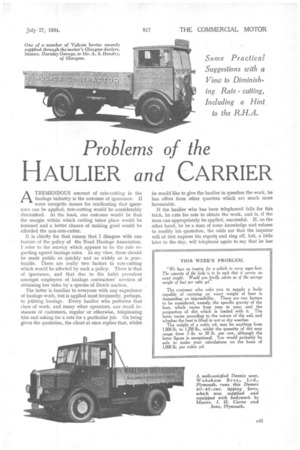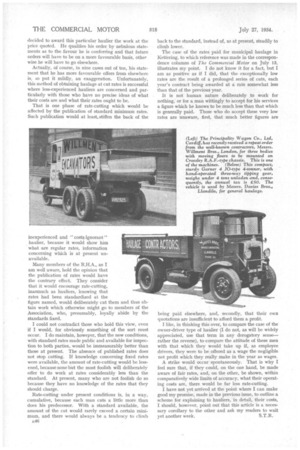Problems of the
Page 63

Page 64

If you've noticed an error in this article please click here to report it so we can fix it.
HAULIER and CARRIER ATREMENDOUS amount of rate-cutting in the haulage industry is the outcome. of ignorance. If some energetic means for eradicating that ignorance can be applied, rate-cutting would be considerably diminished. At the least, one outcome would be that the margin within which cutting takes place would he lessened and a better chance of making good would be afforded the non-rate-cutter.
It is chiefly for that reason that I disagree with one feature of the policy of the Road Haulage Association. I refer to the secrecy which appears to be the rule regarding agreed haulage rates. In my view, these should be made public as quickly and as widely as is practicable. There are really two factors in rate-cutting which would be affected by such a policy. There is that of ignorance, and that due to the habit prevalent amongst employers of haulage contractors' services of obtaining low rates by a species of Dutch auction.
The latter is familiar to everyone with any experience of haulage work, but is applied most frequently, perhaps, to jobbing haulage. Every haulier who performs that class of work, and many other operators, can recall instances of customers, regular or otherwise, telephoning him and asking for a rate for a particular job. On being given the quotation, the client at once replies that, whilst he would like to give the haulier in question the work, he has offers from other quarters which are much more favourable.
If the haulier who has been telephoned falls for this trick, he cuts his rate to obtain the work, and is, if the term can appropriately be applied, successful. If, on the other hand, he be a man of some knowledge and refuses to modify his quotation, the odds are that the inquirer will at first express his regrets and ring off, but, a little later in the day, will telephone again to say that he has
decided to award this particular haulier the work at the price quoted. He qualifies his order by nebulous statements as to the favour he is conferring and that future orders will have to be on a more favourable basis, other wise he will have to go elsewhere.
Actually, of course, in nine cases out of ten, his statement that he has more favourable offers from elsewhere is, co put it mildly, an exaggeration. Unfortunately, this method of obtaining haulage at cut rates is successful where less-experienced hauliers are concerned and particularly with those who have no precise ideas of what their costs are and what their rates ought to be.
That is one phase of rate-cutting which would be affected by the publication of standard minimum rates. Such publication would at least, stiffen the back of the inexperienced and " costignorant " haulier, because it would show him what rare regular rates, information concerning which is at present unavailable.
Many members of the R.H.A., as I am well aware, hold the opinion that the publication of rates would have the contrary effect. They consider that it would encourage rate-cutting, inasmuch as hauliers, knowing that rates had been standardized at the figure named, would deliberately cut them and thus obtain work which otherwise might go to members of the Association, who, presumably, loyally abide by the standards fixed.
I could not contradict those who hold this view, even if I would, for obviously something of the sort must occur. I do maintain, howeyer, that the new conditions, with standard rates made public and available for inspection to both parties, would be immeasurably better than those at present. The absence of published rates does not stop cutting. If knowledge concerning fixed rates were available, the amount of rate-cutting would be lessened, because none but the most foolish will deliberately offer to do work at rates considerably less than the standard. At present, many who are not foolish do so because they have no knowledge of the rates that they should charge.
Rate-cutting under present conditions is, in a way, cumulative, because each man cuts a little more than does his predecessor. With a standard available, the amount of the cut would rarely exceed a certain minimum, and there would always be a tendency to climb atol back to the standard, instead of, as at present, steadily to climb lower.
The case of the rates paid for municipal haulage in Kettering, to which reference was made in the correspondence columns of The Commercial Motor on July 13, illustrates my point. I do not know it for a fact, but I am as positive as if I did, that the exceptionally low rates are the result of a prolonged series of cuts, each year's contract being awarded at a rate somewhat less than that of the previous year.
It is not human nature deliberately to work for nothing, or for a man wittingly to accept for his services a figure which he knows to be much less than that which is generally paid. Those who do accept these very low rates are unaware, first, that much better figures are being paid elsewhere, and, secondly, that their own quotations are insufficient to afford them a profit.
I like, in thinking this over, to compare the case of the owner-driver type of haulier (I do not, as will be widely appreciated, use that term in any derogatory sense— rather the reverse), to compare the attitude of these men with that which they would take up if, as employee drivers, they were to be offered as a wage the negligible net profit which they really make in the year as wages.
A strike would occur spontaneously. That is why I feel sure that, if they could, on the one hand, be made aware of fair rates, and, on the other, be shown, within comparatively wide limits of accuracy, what their operating costs are, there would be far less rate-cutting.
I have not yet arrived at the point where I can make good my promise, made in the previous issue, to outline a scheme for explaining to hauliers, in detail, their costs, I should, however, pOint out that this article is a necessary corollary to the other and ask my readers to wait yet another week. S.T.R.




































































































